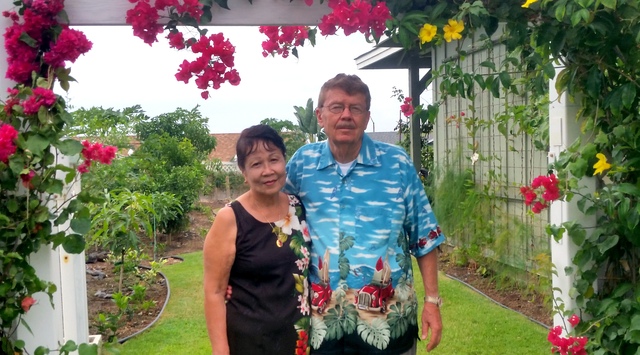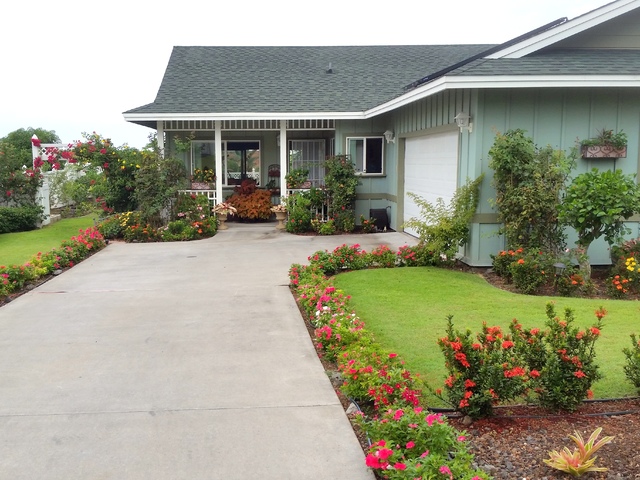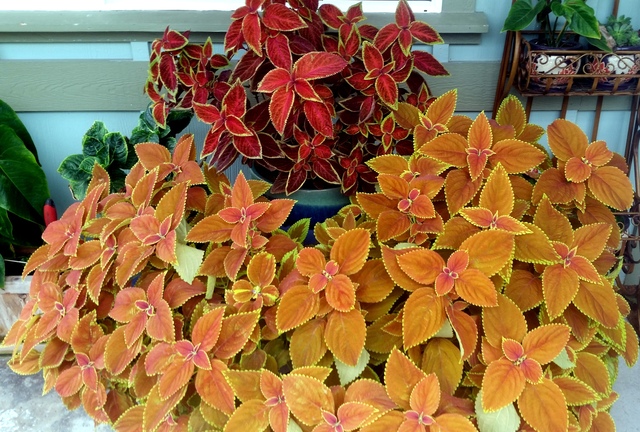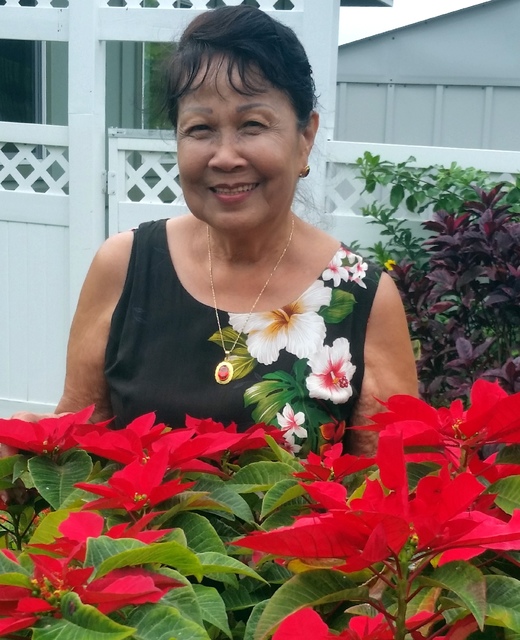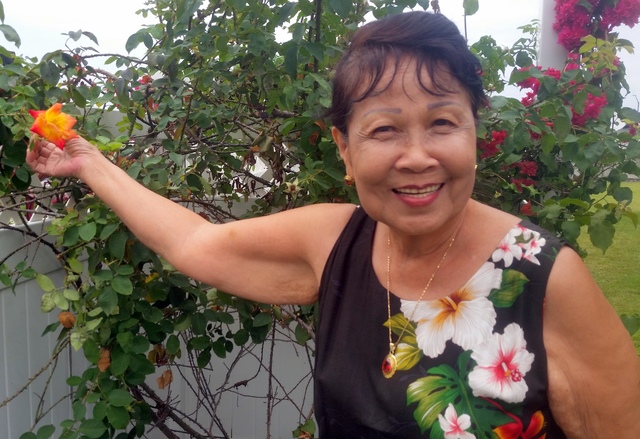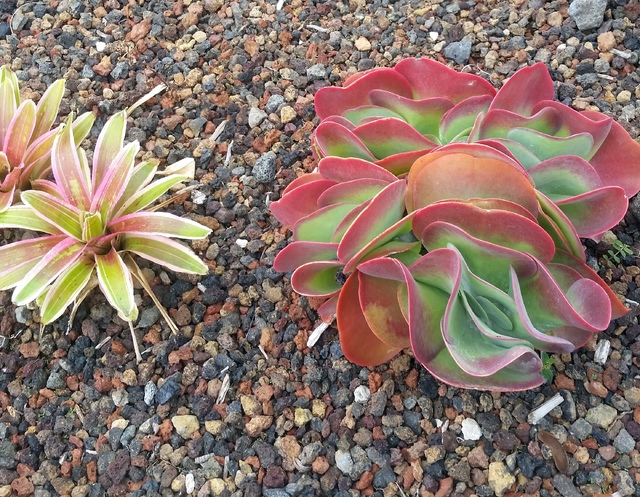In the Lokahi Makai neighborhood of patchy green lawns, Elvira Phelps’ front yard is ablaze with flowers. Her passion for plants is beautifully displayed in rows of ixora, mixed with bougainvillea, colorful hibiscus, interesting succulents and lovely blooming poinsettias. When Elvira and her husband, Dennis, moved to North Kona two years ago from Colorado, they began landscaping with Elvira’s favorite flowering plants, as well as a variety of edibles for their personal use.
Elvira’s enthusiasm for her garden is contagious. She reports that many in her community come by to enjoy her garden and often ask for tips on growing tropical plans. Part of her joy in gardening is sharing her knowledge with others.
Growing up in the Philippines, Elvira learned a lot about tropical plants. Though her father was a businessman and they lived in the city, she often went with him to visit his farms. The farms he owned were on some of the small islands in the Philippine archipelago. The tenants there grew coconuts, mangoes, papayas, bananas and other tropical fruit, which fascinated Elvira.
Shortly after she married in the Philippines, Elvira started her own garden on a lot she and her husband borrowed from her sister. In the front of their house, they planted flowers and dwarf fruit trees, as well as roses and potted bonsai plants. She was especially proud of her blue roses, which she has not been able to find or duplicate here in Hawaii.
In her early jobs as a nurse and an educator, she’d harken back to her childhood experiences and encouraged her students to work in the community to help people grow healthy food in their backyards. She also worked for a while in the provincial government educating local farmers on ways to grow food organically using modern techniques and equipment. In this job she became dedicated to growing her own food organically. Today, her backyard is filled with fruit and vegetables that she grows using organic methods.
She migrated here in the United States and resided in Colorado to continue her nursing career and met and married Dennis. Once they retired, they decided to find a place where Elvira could pursue her passion for tropical plants. They chose Hawaii. Though she claims no favorites, she has definitely designed her front yard garden with red, yellow and orange flowers. Many of them are species found in Hawaii, but most are actually special varieties that she has ordered from Asia. Though her front yard is in full sun, she has a wonderful display of shade- loving coleus varieties in the shade provided at her front entrance.
Despite her years of experience, Elvira found gardening in North Kona was an unexpected challenge. They first had to remove large rocks, then dig into hard soil and add lots of organic matter, including compost, to improve the soil and provide nutrition for her plants. Before planting she applied a thick layer of mulch in all her beds to hold moisture and increase microbial activity. For her, it was all a labor of love and her reward is in the lovely gardens she now tends for about three hours every morning.
Near the trellised entrance to her backyard, Elvira showed off her prize Chinese rose, called Joseph’s Coat, which was nearing the end of its bloom cycle. That and a bright red passion fruit variety added color to the white wooden fence that surrounds three sides of their property.
The backyard is where she grows edibles and some prized varieties of ornamentals. One of her special plants is the ylang-ylang tree she ordered from India. The flowers of this variety are actually used to make Channel 5 perfume. Placed near the house, the fragrant flowers fill the bedroom with their unique scent when they are in bloom. She’s also planted the usual mangos, citrus, lilikoi and papayas, and added four temperate apple varieties, all grafted onto a single tree. Her exotic tropical fruit trees include acerola, atemoya, sapodilla, star apple and some special banana varieties ordered from Cambodia. One of the pleasures Elvira gets from her garden is sharing her bounty. She often delights her neighbors with part of her harvest and truly enjoys their pleasure and gratitude in receiving interesting and tasty produce.
Lots of her vegetables grow in raised beds made from cement blocks with onions or carrots in the pukas. She has peppers, green beans, eggplant, okra, lettuce and squash going and some new tomato seedlings recently installed. She is also growing bitter melon vines on the fence in her back yard. Since many of us view bitter melon as a weed, it was interesting to know that the fruit is revered in the Philippines, has many medicinal properties and can be used in a tasty dish.
A demonstration and tasting followed her explanation. First, she cuts the green fruit in half lengthwise then removes the seeds and cuts each half into thin slices. Sautéeing the melon pieces with onion and garlic and mixing in an egg, once the veggies are soft, finished the dish. Most of the bitterness of the melon was overpowered by the other flavors providing an unexpected taste treat to enjoy.
Part of Elvira’s morning ritual in the garden is to talk to her plants. She says by careful observation she learns what they need. Sometimes, if they aren’t producing, she finds she has to actually threaten them in order to gain an understanding of what they are lacking. Once the communication is complete, the problem is usually solved. She finds the daily communication with her plants is part of the joy of gardening. She identifies this practice as the secret to her gardening success. Plant health often depends on our awareness of their problems and their needs. Paying close attention is a good practice for any gardener who wants a thriving garden. Try tuning into your plants and you’ll notice that doing so has a positive effect on their health and vitality, as well as your own wellbeing.
Diana Duff is a plant adviser, educator and consultant living on a farm in Honaunau.







